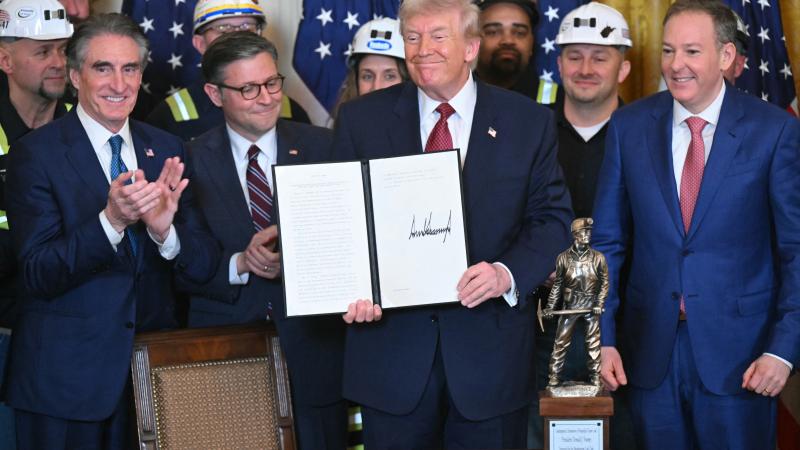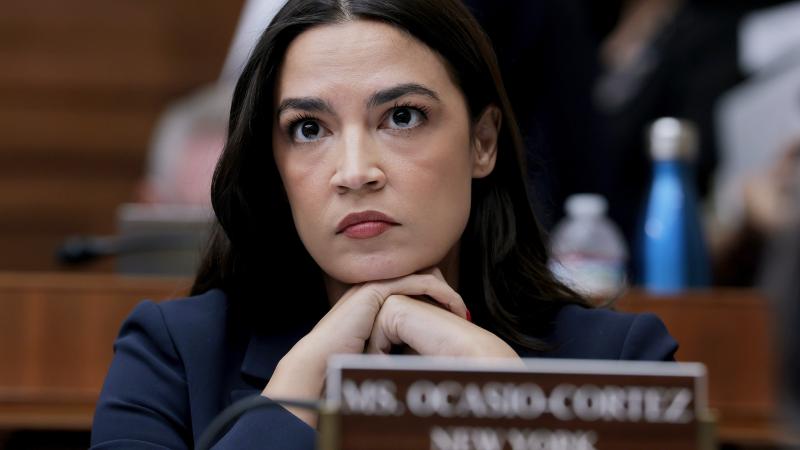Federal judge’s injunction ruling filled with scathing criticism of Biden admin’s LNG pause
Trump-appointed Judge James Cain called the Biden administration's decision to pause LNG export permits "completely without reason or logic and is perhaps the epiphany of ideocracy."
A federal judge Monday sided with 16 states seeking to stay the Biden administration’s pause on liquified natural gas (LNG) export permits while the courts weigh the case they filed against the Department of Energy (DOE).
In his ruling, Trump-appointed Judge James Cain of the U.S. District Court for the Western District of Louisiana ordered that “the LNG Export Ban be stayed in its entirety, effective immediately.”
In March, 16 states sued the Biden administration over the pause, alleging that the policy is illegal and would cause serious harm to the plaintiff states, local communities and the energy sector of the United States.
Louisiana Attorney General Liz Murrill, who led the coalition in the lawsuit, praised Cain’s decision to issue the injunction.
"This is great news for Louisiana, our 16 state partners in this fight, and the entire country. As Judge Cain mentioned in his ruling, there is roughly $61 billion dollars of pending infrastructure at risk to our state from this illegal pause,” Murrill said in a statement.
In issuing a preliminary injunction, the plaintiffs have to demonstrate that they are likely to win their case, that they’ll suffer irreparable harm if the injunction isn’t granted, that the injunction wouldn’t harm other interested parties, and that it serves the public interest.
In explaining how the plaintiffs met those conditions, Cain offered a scathing rebuke of the Biden administration’s LNG export permit pause.
“It appears that the DOE’s decision to halt the permit approval process for entities to export LNG to non-FTA [free trade agreement] countries is completely without reason or logic and is perhaps the epiphany of ideocracy,” Cain wrote.
Biden administration’s position
President Joe Biden executed the pause in January because of “historic hurricanes and floods wiping out homes, businesses and houses of worship."
The policy impacts only those applications for export permits to non-FTA countries. There are currently 20 countries with free trade agreements with the U.S., and none of them are European nations. According to the Energy Institutes' “Statistical Review of World Energy,” most LNG exports from the U.S. are bound for Europe. There are currently more than 20 applications for non-FTA export permits sitting with the DOE.
It’s unclear why Biden believes that there have been historic hurricanes and floods. The National Ocean and Atmospheric Administration explains that “the historical Atlantic hurricane data at this stage do not provide compelling evidence for a substantial greenhouse warming-induced century-scale increase in: frequency of tropical storms, hurricanes, or major hurricanes, or in the proportion of hurricanes that become major hurricanes."
With regards to floods, the Intergovernmental Panel on Climate Change states that “there is low confidence in the human influence on the changes in high river flows on the global scale. In general, there is low confidence in attributing changes in the probability or magnitude of flood events to human influence because of a limited number of studies, differences in the results of these studies and large modelling uncertainties.”
While Biden claimed to be addressing a “climate crisis” with the pause on LNG exports, Cain stated in his ruling that “it is undisputed that natural gas is cleaner than coal.” He also pointed out that U.S. LNG exports reduce gas prices, which cuts down on the reliance on coal by countries importing it.
The DOE issues export permits after determining if they’re in the public interest. The Biden administration, in pausing the permits, argued it was necessary in order to update environmental analysis that will inform its future decisions on whether to issue or deny the permits.
Likelihood of success
In considering the injunction request, Cain pointed out that the plaintiffs had submitted evidence that in the past, the DOE had managed to update such studies without halting the entire approval process. This demonstrated that Biden’s pause, Cain wrote, is “arbitrary and capricious.”
The judge didn’t find convincing evidence that the DOE had done a proper cost-benefit analysis concerning the impact of the pause on national security, state revenues, employment opportunities, funding for schools and charities, and pollution caused by reliance on foreign energy sources, which produce natural gas without the same environmental safeguards as the U.S.
“Considering all, the Court finds that Plaintiff States have a likelihood of success on the merits as to the claims,” Cain wrote.
This was not the first time that Cain had stomped on the Biden administration’s climate policies. Last year, the Bureau of Ocean Energy Management (BOEM) restricted an oil and gas lease sale in the Gulf of Mexico — a concern the agency doesn’t extend to offshore wind projects — and Cain granted a preliminary injunction in that matter.
In 2022, E&E News reports, Cain ruled that the administration couldn’t use a metric known as the “social cost of carbon” to estimate the cost of carbon emissions. The decision was later reversed by the 5th U.S. Circuit Court of Appeals.
What now?
It’s unclear how much the injunction will impact the DOE’s action on pending export permit applications.
The White House, in a statement to the Associated Press, said it remains “committed to informing our decisions with the best available economic and environmental analysis, underpinned by sound science.”
Craig Segall, vice president of the the anti-fossil fuel activist group Evergreen Action, called LNG facilities “deadly” and accused Cain of being a “Trump-appointed ideologue” acting in the interest of “big oil.”
“It’s no surprise that a Trump judge would bend the law to hand the oil industry a win. Luckily, today’s deeply misguided ruling from the Western District of Louisiana should have no impact on the Department of Energy’s statutory authority over what must be included in a public interest determination,” Segall said in a statement.
Segall told Axios that federal law doesn’t impose a deadline on export permit decisions and only requires a decision to be “expeditious.”
Writing on his “Energy Absurdities” Substack, energy analyst David Blackmon said the DOE has a variety of means to withhold decisions on export permit applications, but Cain’s ruling, at the very least, will make it difficult for the Biden administration to make the pause permanent.
“The decision is a significant win for the 16 state attorneys general and for America’s LNG industry, but no one should think it will become the final move on this administrative and political chessboard. What happens next is anyone’s guess,” Blackmon wrote.
The Facts Inside Our Reporter's Notebook
Documents
Links
- federal judge Monday sided with 16 states
- 16 states sued the Biden administration
- Murrill said in a statement
- plaintiffs have to demonstrate
- executed the pause in January
- currently 20 countries with free trade agreements with the U.S.
- Statistical Review of World Energy
- currently over 20 applications
- National Ocean and Atmospheric Administration
- Intergovernmental Panel on Climate Change states
- a concern the agency doesnât extend to offshore wind projects
- Cain granted a preliminary injunction
- E&E News reports
- statement to the Associated Press
- Segall said in a statement
- told Axios
- Energy Absurdities














